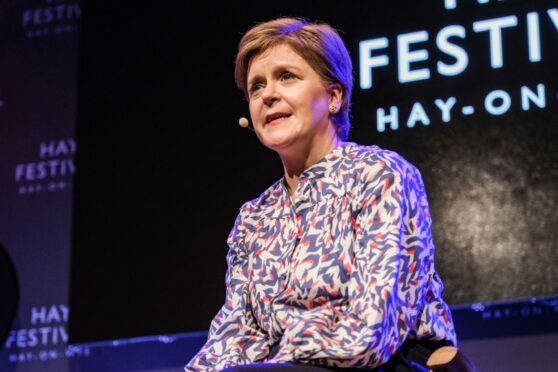
First Minister Nicola Sturgeon has spoken frankly about the challenges of being a woman in politics – warning the constant scrutiny deters many from such a career.
Speaking at the Hay Festival In Hay-On-Wye, Wales, on Friday, the First Minister described the intense scrutiny over her appearance and private life which she says male counterparts do not receive.
Interviewed by BBC journalist Katya Adler, she said social media had given a platform to people who wanted to insult and abuse women in public life.
On being called a “Nippy Sweetie” – an insult aimed at women who stand up for themselves – she said: “Nippy sweetie is a Scottish term, and it means a woman who is a bit mouthy, bolshy and basically speaks up for themselves. It was actually said by a trade union official in a Govan Shipyard, which he meant as a compliment, but it quickly became a term of insult and abuse.”
Sturgeon also faced criticism early in her political career for not smiling enough, and on this she said: “Subconsciously, I was trying to behave like and fit in with the men around me, so I became quite serious. That was never said about another prominent Scottish politician, Gordon Brown. He is not a smiley person but that was not something used against him.”
And she described the frustrations she has faced, including being judged on her legs during Brexit negotiations, when one daily newspaper ran a picture of her and Theresa May, both wearing skirts, with the headline: “Never mind Brexit who won Leg-xit”.
Sturgeon said: “It may sound funny and trivial, but it’s not, because it is objectifying women politicians and reducing them to their body parts.”
Social media has also become a key factor in facilitating this abuse of the First Minister and other women politicians.
Sturgeon said: “Social media amplifies all of that because it is a way for people who have always wanted to hurl sexist and misogynistic abuse at women can get it very directly to them.”
Questions on why she did not have children have also frequently been directed at her.
Sturgeon said: “Every interview that I did which was more behind the politician, I always got asked why I don’t have children. My predecessor as SNP leader doesn’t have children and I am not aware that he was ever once asked that question in any interview.”
These constant questions eventually led to Sturgeon feeling forced to talk about the miscarriage she suffered, saying “it was not an easy thing to do”.
She explained: “It is assumed that you have coldly and in a very calculated way decided to prioritise your career over having children. Of course, any woman is entitled to make that choice, but it is often more complicated.
“So I decided to, in an interview, talk about the miscarriage. It is just one of the many things women in politics have to deal with whilst men don’t.”
The First Minister also said it is this scrutiny, along with endless social media abuse, that is deterring women from entering politics.
“We are seeing more women in senior positions, but at the same time the whole environment is becoming much more hostile for women and it is starting to make women think long and hard whether they want to go into politics.”
These issues parallel the difficulties highlighted in drama series Borgen, which shows a politician becoming the first female prime minister.
“When the main character puts on a suit but realises she can’t fasten it because she has put on weight, that is the kind of thing women have to deal with all the time,” Sturgeon explained.
The issue of sexual harassment has also been a key moment in Sturgeon’s career, with her former political mentor and friend Alex Salmond, being accused of sexual crimes within government.
Sturgeon described this time as one of the “most difficult and traumatic experiences of her life”.
She said: “It was really tough because he had been one of the most important people in my adult life, and a friend, a very close colleague, and to suddenly be hit with that, and all of these different emotions was tough.”

Enjoy the convenience of having The Sunday Post delivered as a digital ePaper straight to your smartphone, tablet or computer.
Subscribe for only £5.49 a month and enjoy all the benefits of the printed paper as a digital replica.
Subscribe